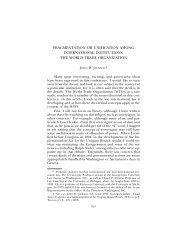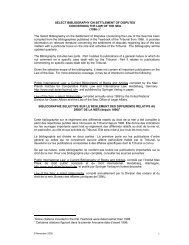Tullio Treves, Conflicts Between the International Tribunal for the ...
Tullio Treves, Conflicts Between the International Tribunal for the ...
Tullio Treves, Conflicts Between the International Tribunal for the ...
Create successful ePaper yourself
Turn your PDF publications into a flip-book with our unique Google optimized e-Paper software.
1999] INTERNATIONAL TRIBUNAL FOR THE LAW OF THE SEA 819Those bound by <strong>the</strong> compulsory jurisdiction of <strong>the</strong> <strong>Tribunal</strong>number thirteen, including Belgium, Finland, Italy, andOman. The obligation of <strong>the</strong>se states to submit to <strong>the</strong> jurisdictionof <strong>the</strong> Court or of <strong>the</strong> <strong>Tribunal</strong> only applies to disputesbetween states having accepted <strong>the</strong> jurisdiction of <strong>the</strong> Court orof <strong>the</strong> <strong>Tribunal</strong>. For all o<strong>the</strong>r disputes, arbitration remainscompetent according to Article 287.An initial observation prompted by this data is that <strong>the</strong>overwhelming majority of states having expressed a preferencehave selected permanent judicial bodies. Only two states haveexpressed a preference <strong>for</strong> arbitration. It may be added that<strong>the</strong> policy of limiting <strong>the</strong> impact of <strong>the</strong> rules in Article 287favoring arbitration can be pursued by declarations such asthose made by Finland, Italy, and Oman—choosing <strong>the</strong> Courtand <strong>the</strong> <strong>Tribunal</strong> without expressing a preference. This policywas clearly expressed by Italy in its declaration choosing <strong>the</strong>Court and <strong>the</strong> <strong>Tribunal</strong>:In making this declaration under Article 287 of <strong>the</strong>Convention on <strong>the</strong> Law of <strong>the</strong> Sea, <strong>the</strong> Governmentof Italy is reaffirming its confidence in <strong>the</strong> existinginternational judicial organs. In accordance with Article287, paragraph 4, Italy considers that it has chosen“<strong>the</strong> same procedure” as any o<strong>the</strong>r state partythat has chosen <strong>the</strong> <strong>International</strong> <strong>Tribunal</strong> <strong>for</strong> <strong>the</strong>Law of <strong>the</strong> Sea or <strong>the</strong> <strong>International</strong> Court of Justice. 26A second observation prompted by <strong>the</strong> data is that <strong>the</strong>great majority (approximately two-thirds) of states parties to<strong>the</strong> Convention have nei<strong>the</strong>r accepted <strong>the</strong> optional clause normade a declaration under Article 287. In light of this observation,one may ask whe<strong>the</strong>r <strong>the</strong> states that have expressed nopreference are satisfied with <strong>the</strong> “residual rule” of Article 287,paragraph 5, stating that “if <strong>the</strong> parties have not accepted <strong>the</strong>same procedure <strong>for</strong> <strong>the</strong> settlement of <strong>the</strong> dispute,” compulsoryjurisdiction under <strong>the</strong> Convention belongs to an arbitral tribunal.The answer may be affirmative in some cases, when <strong>the</strong>state in question has a deeply rooted attachment to arbitration26. Multilateral Treaties Deposited with <strong>the</strong> Secretary-General, Status as of 31December 1997, at 812, U.N. Doc. ST/LEG/SER.B/16 (1998). In <strong>the</strong> originalFrench version of its declaration, Italy expresses its confidence in <strong>the</strong> “organespermanents de justice internationale.” A better translation thus would havebeen “permanent” instead of “existing” international judicial organs.






